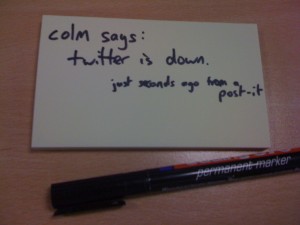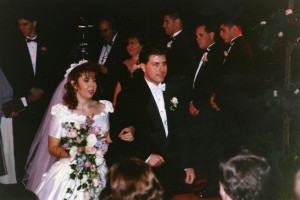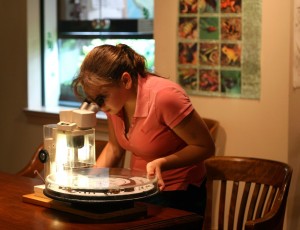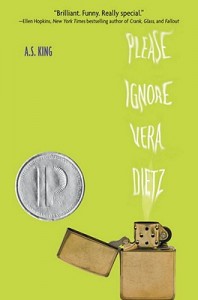A few weeks back I changed how I approach Follow Friday on Twitter. I still try* to pass on a few good recommendations, but I’ve never been a fan of #FF posts that feel more like noise than signal. So I’ve tried to follow the advice implied by this comic at The Oatmeal and highlight one or two people per week and reasons why those who enjoy my tweets might enjoy theirs.
But the other thing I’ve done—and it’s something I haven’t seen anybody else suggesting out there—is ditch the #FF hashtag.
If you really get hashtags, then skip this paragraph and the next one. I don’t mean to condescend, but it’s also clear to me that many of my friends and acquaintances don’t get what hashtags are really about. A lot of us use hashtags as a form of ironic metacomment on our own post, and there’s nothing wrong with that. A lot of people on twitter also use hashtags to tell the world what they’re doing (eg, #amwriting and #amreading) without an awareness of the fact that there are actual online communities that follow these hashtags. But the real point of hashtags—and I say this is the real point, or else why would hashtags be clickable?—is to allow us to cross-pollinate our twitter experience. Hashtags allow us to talk with people who aren’t already our followers, and possibly meet cool new people. If you’re a writer, click on the #amwriting hashtag sometime, and you’ll see a bunch of people all tweeting about their writing experience. Some of them will actually be cool and worth interacting with.** Instead of automatically following back every spammer who follows you with no intention of ever actually interacting with you, you can use hashtags to find the people who are genuinely using twitter as part of a giant conversation.
You can find an excellent breakdown of how to use hashtags well in this terrific post from Kristin Lamb. Among other things, you’ll learn why you should use a client like TweetDeck to get the most out of Twitter, and why you should strip the hashtags off of tweets when you retweet them dagnabbit! ::breathes::
Anyway, since hashtags are so wonderful, why am I so down on #FF?
As I see it, the purpose of Follow Friday is to let my friends know who else I like, and thus, by extension, who else they might like. What purpose, then, does the hashtag serve? My friends will see the post either way, because they follow me. People who don’t follow me aren’t interested in who I think is cool.
But let’s suppose for argument’s sake that I’m wrong about that, and that #FF isn’t just about telling my friends who they might like, but literally about telling the world who to follow. Let’s try a little experiment then. This Friday—and this works best if you use Tweetdeck or something similar—click on the #ff hashtag the next time you see it pop up. Don’t come back to this post until after you’ve done it. 😉
I’m sorry; that was a dirty trick to play wasn’t it? How long did it take you to delete that column on Tweetdeck? Or have you still not succeeded in deleting it? If so, here’s the trick: grab Tweetdeck by the bar at the top of the window and drag it down on your screen until the little X to close the column is no longer covered by the constant stream of little popups in the upper right corner of your screen. Or you could just wait until it’s Saturday for most of the world.
The point? Even if we grant that Follow Friday can be used to tell strangers who to follow, it’s clearly broken by the fire-hose-like stream of tweets, most of which actually say nothing about the people listed.
Who can read that fast?
Other than spambots, that is.
When you stick the #FF hashtag on your Friday recommendations, you’re not really increasing the likelihood of gaining legitimate followers for your friends. I don’t know for sure that it increases the likelihood of your friends being spambait, but I do know that I can’t tweet the word “iPad” without immediately attracting spambots, so it doesn’t seem at all unreasonable to suppose.
In any case, I can’t see any possible upside. so why bother?


 In the wake of Texas Representative Lamar Smith pulling the Stop Online Piracy Act from consideration yesterday(and Senator Harry Reid doing the same for the Protect IP Act), I saw a lot of jubilant tweets saying that
In the wake of Texas Representative Lamar Smith pulling the Stop Online Piracy Act from consideration yesterday(and Senator Harry Reid doing the same for the Protect IP Act), I saw a lot of jubilant tweets saying that 




 Subscribe via RSS
Subscribe via RSS